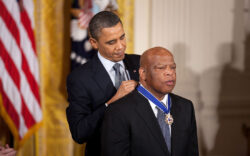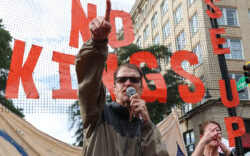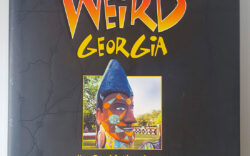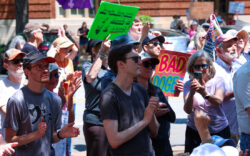With a blinding flash and a deafening roar, the Atomic Age began over the Japanese city of Hiroshima on Aug. 6, 1945, when an American B-29 bomber dropped the first nuclear weapon to be used in warfare.
Three days later, another U.S. plane dropped a second atomic bomb on Nagasaki, Japan. Those two explosions are the only times that atomic weapons have been used against civilian populations—so far. Japan surrendered just days after tens of thousands died in the two nuclear attacks, and World War II finally ended after six long and bloody years of conflict that began with the Nazi invasion of Poland in 1939. A world war that ended with nuclear fire soon became a “Cold War” as the United States and the Soviet Union increased their atomic arsenals to thousands of nuclear warheads on each side.
Senji Yamaguchi was just 14 years old when the second nuclear bomb did its deadly work on his hometown of Nagasaki 76 years ago. As a young journalist in 1980, I talked with him when he visited the United States as part of an international peace tour. When the bomb dropped on Nagasaki in 1945, Yamaguchi was just a mile from “Ground Zero” but somehow he survived—though he carried physical and emotional scars that stayed with him until his death in 2013. Recalling that dark day of his youth, Yamaguchi described a hellish scene in the aftermath of the bombing.
“A gigantic flash knocked me out,” he recalled. “When I awoke and looked around, the sight was beyond imagination. Many dead were on the ground. Survivors were groaning and crying for water. By evening they had died. I crossed a river filled with the bodies of humans and horses. I met a young woman along the way carrying the headless body of her baby. She was quite mad with fear and grief and didn’t seem to realize the baby was headless. I saw one woman scream for her mother, then fall over dead. People were scorched black like charcoal, people without arms or legs. No pen, no poet, no genius could put on paper what I saw that day.”
Yamaguchi was scarred for life by severe burns that required 13 skin grafts and months of hospitalization. His despair led him to attempt suicide in the 1950s. He told me that, after the bombing, he at first had hated the United States because of his plight, but he added that, as he became a peace activist, he instead grew angry with Japan’s wartime fascism, militarism and suppression of dissent. Yamaguchi saw nuclear war as both a personal injury and a worldwide threat. “I am determined that this thing should never happen again,” he said.
During the early days of the Cold War, only the United States, Russia, Great Britain and France had atomic weapons. China soon joined the “nuclear club”—a club that became much less exclusive as India, Pakistan, Israel and North Korea also became members. Like millions of Americans in the postwar era, I was both frightened and fascinated by “The Bomb.” As a child in 1952, I watched the first live television coverage of a nuclear test that was both eerie and ominous even on a small screen black and white TV. Ten years later, I worried along with millions of other Americans as the Cuban Missile Crisis played out on the nation’s TV screens. The early Atomic Age was fodder for books like Alas, Babylon by Pat Frank and Tomorrow by Philip Wylie. Hollywood depicted nuclear Armageddon with movies like the mordantly satirical Dr. Strangelove and the deadly serious Fail-Safe. On television, writer Rod Serling’s “The Twilight Zone” chilled viewers in 1961 with a story called “The Shelter” that showed friendly neighbors becoming savages as the specter of nuclear war threatened to turn their suburbia into a radioactive hellscape. It has been 76 years since nuclear weapons were used in warfare, and today’s young Americans have no memory of the Cold War, but the words that World War II Army General Omar Bradley spoke in 1948 still ring true today on this imperiled Planet Earth: “Ours is a world of nuclear giants and ethical infants.”
Like what you just read? Support Flagpole by making a donation today. Every dollar you give helps fund our ongoing mission to provide Athens with quality, independent journalism.










